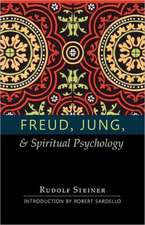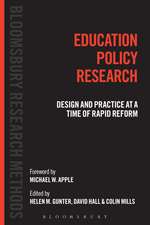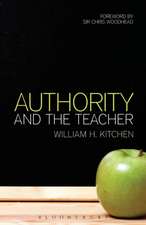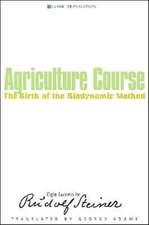Education: Pocket Library of Spiritual Wisdom
Autor Rudolf Steiner Traducere de C. VON ARNIMen Limba Engleză Paperback – 5 oct 2003
Steiner's original contribution to human knowledge was based on his ability to conduct spiritual research, the investigation of metaphysical dimensions of existence. With his scientific and philosophical training, he brought a new systematic discipline to the field, allowing for conscious methods and comprehensive results. A natural seer from childhood, he cultivated his spiritual vision to a high degree, enabling him to speak with authority on previously veiled mysteries of life.
Topics include: a social basis for education; the spirit of the Waldorf school; educational methods based on anthroposophy; children at play; teaching through the insights of spiritual science; adolescents after the fourteenth year; science, art, religion, and morality; the spiritual basis of education; the role of caring in education; the roots of education and the kingdom of childhood; address at a parents' evening; and education within the broader social context."
Preț: 74.77 lei
Nou
Puncte Express: 112
Preț estimativ în valută:
14.31€ • 15.55$ • 12.03£
14.31€ • 15.55$ • 12.03£
Carte disponibilă
Livrare economică 31 martie-14 aprilie
Livrare express 15-21 martie pentru 19.71 lei
Preluare comenzi: 021 569.72.76
Specificații
ISBN-13: 9781855841185
ISBN-10: 1855841185
Pagini: 214
Ilustrații: Illustrations
Dimensiuni: 126 x 176 x 20 mm
Greutate: 0.24 kg
Editura: Sophia Books
Seria Pocket Library of Spiritual Wisdom
Locul publicării:United Kingdom
ISBN-10: 1855841185
Pagini: 214
Ilustrații: Illustrations
Dimensiuni: 126 x 176 x 20 mm
Greutate: 0.24 kg
Editura: Sophia Books
Seria Pocket Library of Spiritual Wisdom
Locul publicării:United Kingdom
Notă biografică
Rudolf Steiner (1861-1925) was born in the small village of Kraljevec, Austro-Hungarian Empire (now in Croatia), where he grew up. As a young man, he lived in Weimar and Berlin, where he became a well-published scientific, literary, and philosophical scholar, known especially for his work with Goethe's scientific writings. At the beginning of the twentieth century, he began to develop his early philosophical principles into an approach to systematic research into psychological and spiritual phenomena. Formally beginning his spiritual teaching career under the auspices of the Theosophical Society, Steiner came to use the term Anthroposophy (and spiritual science) for his philosophy, spiritual research, and findings. The influence of Steiner's multifaceted genius has led to innovative and holistic approaches in medicine, various therapies, philosophy, religious renewal, Waldorf education, education for special needs, threefold economics, biodynamic agriculture, Goethean science, architecture, and the arts of drama, speech, and eurythmy. In 1924, Rudolf Steiner founded the General Anthroposophical Society, which today has branches throughout the world. He died in Dornach, Switzerland.



















